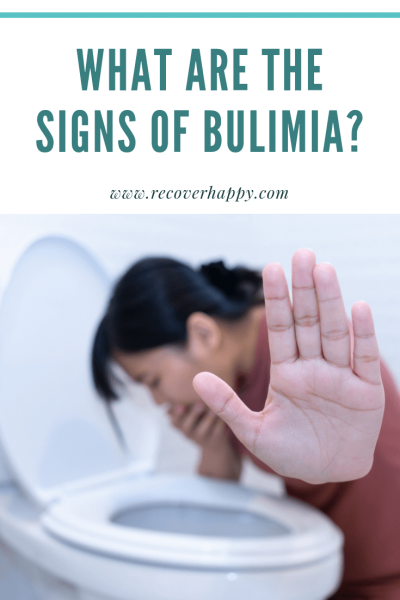What are the warning signs of bulimia?

By Tanja _ October 14, 2019
Did you know that “bulimia” is the Latin form of the Greek word “boulimia”, which means ravenous hunger?
Like other eating disorders, bulimia is a serious condition and can become potentially life-threatening. Unlike anorexia, bulimia isn’t associated with significant weight loss. It centres on food, weight but also on self-image, which can make it one of the most difficult eating disorders to overcome.
In fact, bulimia is often used as a way to manage emotional pain. One moment you may see food as the only way to deal with unpleasant emotions and feelings, so you find yourself eating a large amount of food in a short time period. Moments later, you might see eating as the cause of all the problems in your life and you try to get rid of the large amount of food you have consumed as quickly as possible. The methods used include self-induced vomiting, dieting, medication and exercising excessively.
I would like to share with you the main behavioural, psychological and physiological signs of bulimia, to help you identify if you are affected by it or are more likely to develop it.
Behavioural signs of bulimia
- You secretly eat a large amount of food in a short period of time. This amount is much larger than your friends or family would consume in a similar situation. Afterwards you undertake compensatory measures, such as going to the bathroom to vomit, fasting, using diuretics or laxatives, or over-exercising despite illness, injury or bad weather. To deal with the odour of vomit, you might use excessive amounts of mints, gum and mouthwash.
- You have food and eating-related rituals. You might chew excessively, drink large amounts of water, allow yourself to eat only particular types of food or cut out whole food groups. For example you might cut out sugar or other carbs, or you might follow a vegetarian or vegan diet in order to restrict the types of food you eat.
- You plan your life around bingeing, purging, exercising and food shopping, which might lead you to neglect important everyday activities.
- You isolate yourself more and more, as you might feel uncomfortable eating in front of friends or in public.
- You are very concerned about your weight and shape, you check your appearance regularly in the mirror or you compare your body with the bodies of others.
- You drink more alcohol than you used to do or become engaged in substance abuse to achieve your ideal weight.
Psychological signs of bulimia
- You experience an extreme fear of gaining weight.
- You feel ashamed, disgusted, embarrassed, hopeless and guilty about yourself after bingeing, purging and failing to control yourself.
- You carry a constant burden of trying to keep your eating problem secret, which might make you feel stressed, depressed and anxious.
- You feel less confident and you are more dissatisfied with your appearance as you used to be.
- Your think a lot about food, your body shape and your weight, perhaps to the extent that it ultimately becomes an obsession.
- You experience extreme mood swings due to a lack of nutrients such as vitamins and minerals.
- You even have suicidal thoughts due to the high level of stress you experience and your desperation about your body image.
Physiological signs of bulimia
- You have difficulties concentrating and may feel general weakness, dizziness and fatigue due to frequent purging.
- You experience stomach pain and a sore throat due to the build-up of acid from persistent vomiting.
- You become aware of damage to your teeth due to the high concentration of acidin your mouth from vomiting. This might result in cavities, tooth sensitivity, enamel erosion and even loss of teeth.
- You experience hormonal imbalance, which might cause you to miss your period or lose your sex drive.
- You have cuts, calluses or scars on the back of your hands, due to their frequent contact with your incisors when you induce vomiting.
- You have dry skin, nails and hair or perhaps even hair loss, as regular purging dehydrates your body.
If any of these symptoms of bulimia sound familiar to you, you don’t need to struggle alone. You can learn to break out of the cycle of bulimia, deal better with your emotions, develop a positive relationship with food and your body and regain control over your eating and your life.
Simply get in touch to discuss how I can help you.
It is entirely possible to overcome bulimia – others have done it and so can you!



